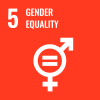Traffickers ruined the dreams of Sherrynorth, 27, from Ghana, and 18-year-old Adaku, from Nigeria. Photo: IOM/Lauriane Marie Wolfe
Twenty-seven-year-old Sherrynorth from Ghana, and 18-year-old Adaku from Nigeria have endured a lot already in their lives. Both are smart and creative. Both have big dreams for their futures. Both are survivors of trafficking in persons.
They hope their stories will raise awareness of this scourge among their communities, including their young sisters.
Sherrynorth went to Iraq convinced that she would find greener pastures; when she arrived, the horror hit – she was being trafficked.

Sherrynorth, together with seven other returnees, produced a total of 4,000 nose masks to support the government in their COVID-19 response, under the EU-IOM Joint Initiative for Migrant Protection and Reintegration. Photo: IOM
“I left Ghana in April 2019. When I got to the airport in Erbil, my passport was withdrawn. It was very horrific. Together with other ladies, we were moved to Baghdad. We were forced to work long hours, without rest or time off,” she recalls. “When in need of medical support, we were left suffering. I was abused physically, mentally, emotionally, sexually. Eventually, I managed to escape.”
In October 2019, with support from the International Organization for Migration (IOM) and the United States Department of State’s Office to Monitor and Combat Trafficking in Persons, she was assisted with voluntary return to Ghana. Her reintegration process was challenging, even more so after COVID-19 hit in March 2020, but now she works as a seamstress and runs a small second-hand clothing business. She is among a group of returnees making nose masks to support the Government in its COVID-19 response, under the EU-IOM Joint Initiative for Migrant Protection and Reintegration, funded by the European Union Emergency Trust Fund for Africa. “At least I could also help save some lives out there,” she says.
But Sherrynorth's dreams are bigger.

Traffickers ruined the dreams of Sherrynorth, 27, from Ghana, and 18-year-old Adaku, from Nigeria. Photo: IOM/Lauriane Marie Wolfe
“I’m aspiring to be a journalist to reach out to the youth and my fellow young women. So, besides the second-hand clothing business, I am studying in a media school,” she says.
“I wouldn’t want any young girl to go through what I experienced. I was lucky that I got back home because I know some of my sisters are dead without a trace. You should focus on the little you can do in your own country, where you have your peace and no one is going to torment you, and try to set up something here,” she urges young women.
Just like Sherrynorth, Adaku left home in 2019 to seek better economic opportunities. In Nigeria, she was an apprentice hairdresser. She was only 17 years old and was trafficked by a Nigerian woman to Ghana.
“The lady told me I was going to Ghana for work and I would have a good life. I found out that she brought me there for prostitution. I had to run as fast as my legs could take me. I went to the police and they took me to IOM,” Adaku says.
During her stay at a government-run shelter for victims of trafficking, Adaku used poetry, music and writing to process what she had suffered. She wrote over 20 songs, and a short theatre play. Now she urges her Nigerian sisters to think twice before they travel. "You should be careful if someone promises you a better future abroad. They might be liars and take advantage of you.”

Adaku’s dream is to become an actress. She is using poetry, music, and writing to process what she has been through. Photo: IOM
The COVID-19 pandemic prevented Adaku from returning to Nigeria until Ghana reopened its air borders in September 2020. “I am looking forward to going back to school to study theatre. I want to become an actress, my biggest dream,” Adaku said.
Girls and women like them are important messengers for their peers. “I want to be an advocate and lead by a good example," says Sherrynorth. "We need to reach out to each other and be there for one another. Girls face multiple challenges jeopardizing their freedoms every day. We need to ensure that every girl and young woman has the power over her own life, with freedom to move, the freedom to live as we want, the freedom to socialize, the freedom to speak up, and the freedom to take action for positive change, without fear of discrimination or violence or harassment. This is my vision for a future that is equal for young girls.”
IOM Ghana is proud to share the voices of strong and resilient girls and young women. Together, let’s support them to make their vision of an equal future become a reality.
The return and reintegration of the two survivors of trafficking has been supported by the Office to Monitor and Combat Trafficking in Persons, United States Department of State (J/TIP).
Story written by Juliane Reissig, Public Information Officer, IOM Ghana, jreissig@iom.int


